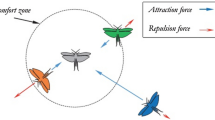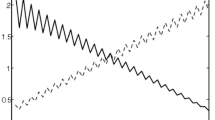Abstract
This work proposes a new approach in addressing Economic Load Dispatch (ELD) optimization problem in power unit systems using nature-inspired metaheuristics search algorithms. Solving such a problem requires a degree of maximization of the economic pact of a power network system, where this is possible with some existing population-based metaheuristic search algorithms. The key issue to be handled here is how to maximize the economic benevolence of a power network under a variety of operational constraints, taking into account the reduction in the generated fuel cost as well as the aggregate power loss in the transmission power network system. Some nature-inspired metaheuristics will be explored. Meanwhile, we shall focus our attention on a newly developed nature-inspired search algorithm, referred to as the Crow Search Algorithm or CSA for short, as well as the Differential Evolution (DE) that is commonly known as a metaheuristic. The CSA emerged to light by simulating the intelligent flocking behavior of crows. The practicability of the proposed approach-based CSA was conducted to common types of power generators, including three and six buses (nodes) in addition to the IEEE 30-bus standard system. The results of the presented approaches were compared to other results developed using existing nature-inspired metaheuristic algorithms like particle swarm optimization and genetic algorithms and also compared to traditional approaches such as quadratic programming method. The results reported here support that CSA has achieved an outstanding performance in solving the problem of ELD in power systems, demonstrating their good optimization capabilities through arriving at a combination of power loads that consummate the constraints of the ELD problem while simultaneously lessening the entire fuel cost. The experimental results also showed that the CSA solutions were capable of maximizing the reliability of the power supplied to the customers, and also reducing both the generated power cost and the loss of power in the transmission power systems.
Access this chapter
Tax calculation will be finalised at checkout
Purchases are for personal use only
Similar content being viewed by others
References
Afful-Dadzie, A., Afful-Dadzie, E., Awudu, I., & Banuro, J. K. (2017). Power generation capacity planning under budget constraint in developing countries. Applied Energy, 188, 71–82.
Aristidis, V. (2006). An ant colony optimization (ACO) algorithm solution to economic load dispatch (ELD) problem. In Proceedings of the 10th WSEAS International Conference on Systems, ICS’06 (pp. 153–160). Stevens Point, Wisconsin, USA: WSEAS.
Askarzadeh, A. (2016). A novel metaheuristic method for solving constrained engineering optimization problems: Crow search algorithm. Computers & Structures, 169, 1–12.
Bergen, A. R. (1986). Power systems analysis. Prentice-Hall series in electrical and computer engineering. Englewood Cliffs, N.J.: Prentice Hall.
Bhattacharya, A., & Chattopadhyay, P. K. (2010). Solving complex economic load dispatch problems using biogeography-based optimization. Expert Systems with Applications, 37(5), 3605–3615.
Bhattacharya, A., & Chattopadhyay, P. K. (2011). Solving economic emission load dispatch problems using hybrid differential evolution. Applied Soft Computing, 11(2), 2526–2537.
Braik, M., & Sheta, A. (2011). Exploration of genetic algorithms and particle swarm optimization in improving the quality of medical images.
Chakraborty, P., Roy, G. G., Panigrahi, B. K., Bansal, R. C., & Mohapatra, A. (2012). Dynamic economic dispatch using harmony search algorithm with modified differential mutation operator. Electrical Engineering, 94(4), 197–205.
Chen, P. H., & Chang, H. C. (1995). Large-scale economic dispatch by genetic algorithm. IEEE Transactions on Power Systems, 10, 1919–1926.
Das, S., Abraham, A., & Konar, A. (2008). Particle swarm optimization and differential evolution algorithms: Technical analysis, applications and hybridization perspectives. In Advances of computational intelligence in industrial systems (pp. 1–38). Springer.
Dewangan, S. K., Jain, A., & Huddar, A. P. (2010). Comparison of particle swarm optimization with lambda iteration method to solve the economic load dispatch problem. International Journal of Advanced Research in Electrical, Electronics and Instrumentation Engineering, 4(4), 1900–1907.
Dubey, H. M., Panigrahi, B. K., & Pandit, M. (2014). Bio-inspired optimisation for economic load dispatch: A review. IJBIC, 6(1), 7–21.
Faris, H., Aljarah, I., et al. (2015). Optimizing feedforward neural networks using Krill Herd algorithm for e-mail spam detection. In 2015 IEEE Jordan Conference on Applied Electrical Engineering and Computing Technologies (AEECT) (pp. 1–5). IEEE.
Faris, H., Mafarja, M. M., Heidari, A. A., Aljarah, I., AlaM, A. Z., Mirjalili, S., et al. (2018). An efficient binary salp swarm algorithm with crossover scheme for feature selection problems. Knowledge-Based Systems, 154, 43–67.
Faris, H., & Sheta, A. F. (2016). A comparison between parametric and non-parametric soft computing approaches to model the temperature of a metal cutting tool. International Journal of Computer Integrated Manufacturing, 29(1), 64–75.
Faris, H., Sheta, A. F., & Öznergiz, E. (2016). MGP-CC: A hybrid multigene GP-Cuckoo search method for hot rolling manufacture process modelling. Systems Science & Control Engineering, 4(1), 39–49.
Gaing, Z. L. (2003). Particle swarm optimization to solving the economic dispatch considering the generator constraints. IEEE Transactions on Power Systems, 18, 1187–1195.
Ghatasheh, N., Faris, H., Aljarah, I., & Al-Sayyed, R. M. (2015). Optimizing software effort estimation models using firefly algorithm. Journal of Software Engineering and Applications, 8(03), 133.
Hardiansyah, Junaidi, & Yohannes, M. S. (2012). Solving economic load dispatch problem using particle swarm optimization technique. International Journal of Intelligent Systems and Applications, 12, 12–18.
Holland, J. H. (1992). Adaptation in natural and artificial systems: An introductory analysis with applications to biology, control and artificial intelligence. Cambridge, MA, USA: MIT Press.
Jabr, R. A., Coonick, A. H., & Cory, B. J. (2000). A homogeneous linear programming algorithm for the security constrained economic dispatch problem. IEEE Transactions on Power Systems, 15(3), 930–936.
Kirchmayer, L. (1979). Economic operation of power systems (1st ed.). New Delhi: Wiley Eastern Limited.
Kuo, C. C. (2008). A novel coding scheme for practical economic dispatch by modified particle swarm approach. IEEE Transactions on Power Systems, 23, 1825–1835.
Lazzerini, B., & Pistolesi, F. (2015). A linear programming-driven MCDM approach for multi-objective economic dispatch in smart grids. In 2015 SAI Intelligent Systems Conference (IntelliSys) (pp. 475–484).
Lee, K. Y., Sode-Yome, A., & Park, J. H. (1998). Adaptive hopfield neural networks for economic load dispatch. IEEE Transactions on Power Systems, 13(2), 519–526.
Lin, W. M., Cheng, F. S., & Tsay, M. T. (2002). An improved tabu search for economic dispatch with multiple minima. IEEE Transactions on Power Systems, 17(1), 108–112.
Lowery, P. (1966). Generating unit commitment by dynamic programming. IEEE Transactions on Power Apparatus and Systems, 5, 422–426.
Mirjalili, S., Gandomi, A. H., Mirjalili, S. Z., Saremi, S., Faris, H., & Mirjalili, S. M. (2017). Salp swarm algorithm: A bio-inspired optimizer for engineering design problems. Advances in Engineering Software, 114, 163–191.
Nguyen, T. T., & Vo, D. N. (2015). The application of one rank cuckoo search algorithm for solving economic load dispatch problems. Applied Soft Computing, 37(C), 763–773.
Noman, N., & Iba, H. (2008). Differential evolution for economic load dispatch problems. Electric Power Systems Research, 78(8), 1322–1331.
Orero, S., & Irving, M. (1996). Economic dispatch of generators with prohibited operating zones: A genetic algorithm approach. IEE Proceedings-Generation, Transmission and Distribution, 143(6), 529–534.
Osman, I., & Kelly, J. (1996). Meta-heuristics: Theory and applications.
Poli, R., Kennedy, J., & Blackwell, T. (2007). Particle swarm optimization. Swarm Intelligence, 1(1), 33–57.
Rahmani, R., Othman, M. F., Yusof, R., & Khalid, M. (2012). Solving economic dispatch problem using particle swarm optimization by an evolutionary technique for initializing particles. Journal of Theoretical and Applied Information Technology, 46(2), 526–536.
Rashaideh, H., Sawaie, A., Al-Betar, M. A., Abualigah, L. M., Al-Laham, M. M., Raed, M., et al. (2018). A grey wolf optimizer for text document clustering. Journal of Intelligent Systems.
Rayapudi, S. R. (2011). An intelligent water drop algorithm for solving economic load dispatch problem. International Journal of Electrical and Electronics Engineering, 5(2), 43–49.
Reid, G. F., & Hasdorff, L. (1973). Economic dispatch using quadratic programming. IEEE Transactions on Power Apparatus and Systems, PAS-92(6), 2015–2023.
Saadat, H. (2008). Power system analysis. McGraw-Hill Companies.
Sahoo, S., Dash, K. M., Prusty, R., & Barisal, A. (2015). Comparative analysis of optimal load dispatch through evolutionary algorithms. Ain Shams Engineering Journal, 6(1), 107–120.
Sen, D., & Acharjee, P. (2016). Hybridization of cuckoo search algorithm and chemical reaction optimization for economic load dispatch problem. In Proceedings of the 2016 International Conference and Exposition on Electrical and Power Engineering (EPE) (pp. 798–804).
Sheta, A., Braik, M. S., & Aljahdali, S. (2012). Genetic algorithms: A tool for image segmentation. In 2012 International Conference on Multimedia Computing and Systems (ICMCS) (pp. 84–90). IEEE.
Sheta, A. F., Faris, H., & Aljarah, I. (2018). Estimating ARMA model parameters of an industrial process using meta-heuristic search algorithms. International Journal of Engineering & Technology, 7(3.10), 187–194.
Storn, R., & Price, K. (1995). Differential evolution-a simple and efficient adaptive scheme for global optimization over continuous spaces [r]. Berkeley: ICSI.
Storn, R., & Price, K. (1997). Differential evolution: A simple and efficient heuristic for global optimization over continuous spaces. Journal of Global Optimization, 11(4), 341–359. https://doi.org/10.1023/A:1008202821328.
Surekha, P., & Sumathi, D. S. (2012). Solving economic load dispatch problems using differential evolution with opposition based learning. WSEAS Transactions On Information Science And Applications (1).
Vesterstrom, J., & Thomsen, R. (2004). A comparative study of differential evolution, particle swarm optimization, and evolutionary algorithms on numerical benchmark problems. IEEE Congress on Evolutionary Computation, 2, 1980–1987.
Wadhwa, C. (2006). Electrical power systems. New Age International.
WKennedy, J., & Eberhart, R. C. (1995). Particle swarm optimization. In Proceedings of IEEE International Conference on Neural Networks, Piscataway, NJ, USA (pp. 1942–1948).
Wood, A. J., & Wollenberg, B. F. (2010). Power generation operation and control (2nd ed.).
Wood, A. J., & Wollenberg, B. F. (2012). Power generation, operation, and control. Wiley.
Yang, X. S. (2008). Nature-inspired metaheuristic algorithms. Luniver Press.
Zaharie, D. (2007). A comparative analysis of crossover variants in differential evolution. In Proceedings of IMCSIT (pp. 171–181).
Author information
Authors and Affiliations
Corresponding author
Editor information
Editors and Affiliations
Rights and permissions
Copyright information
© 2020 Springer Nature Singapore Pte Ltd.
About this chapter
Cite this chapter
Sheta, A., Faris, H., Braik, M., Mirjalili, S. (2020). Nature-Inspired Metaheuristics Search Algorithms for Solving the Economic Load Dispatch Problem of Power System: A Comparison Study. In: Dey, N., Ashour, A., Bhattacharyya, S. (eds) Applied Nature-Inspired Computing: Algorithms and Case Studies. Springer Tracts in Nature-Inspired Computing. Springer, Singapore. https://doi.org/10.1007/978-981-13-9263-4_9
Download citation
DOI: https://doi.org/10.1007/978-981-13-9263-4_9
Published:
Publisher Name: Springer, Singapore
Print ISBN: 978-981-13-9262-7
Online ISBN: 978-981-13-9263-4
eBook Packages: Intelligent Technologies and RoboticsIntelligent Technologies and Robotics (R0)




